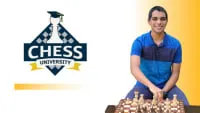
Chess Tips 
This course provides chess tips for middlegames, including how to use pawns, gain the initiative, spot weaknesses, make a plan, defend, and attack the king using the rule of +2. It is suitable for players of all levels, from beginners to experienced players such as former World #2. ▼
ADVERTISEMENT
Course Feature
![]() Cost:
Cost:
Free
![]() Provider:
Provider:
Youtube
![]() Certificate:
Certificate:
Paid Certification
![]() Language:
Language:
English
![]() Start Date:
Start Date:
On-Demand
Course Overview
❗The content presented here is sourced directly from Youtube platform. For comprehensive course details, including enrollment information, simply click on the 'Go to class' link on our website.
Updated in [February 21st, 2023]
How To Use Pawns In Chess Middlegames.
Chess Tips: The Initiative.
Chess Tips: Spotting Weaknesses.
Chess Tips: How To Make a Plan.
Chess Tips: How To Defend.
Chess Tips: Attacking The King, Rule of +2.
I played former World #2 Alexei Shirov | Chess Game Analysis.
My WORST Lost Chess Game Ever....
Chess Tips: Creating Counterplay | Beginner & Intermediate Strategy.
EVERY Chess Gambit for White and Black | Chess Opening Tips.
Eric Rosen Taught Me This... | Stafford, Orthoschnapp, & More Gambits.
NEW CHESS OPENING: THE VAMPIRE GAMBIT.
(Please note that we obtained the following content based on information that users may want to know, such as skills, applicable scenarios, future development, etc., combined with AI tools, and have been manually reviewed)
1. How to use pawns in chess middlegames: Learners can gain an understanding of how to use pawns in chess middlegames, including how to use them to gain an advantage, how to protect them, and how to use them to create counterplay. They can also learn how to use pawns to create a strong defense and how to use them to attack the king.
2. The initiative: Learners can gain an understanding of how to take the initiative in a chess game, including how to spot weaknesses in their opponent's position and how to use those weaknesses to their advantage. They can also learn how to make a plan and how to use the initiative to create counterplay.
3. Spotting weaknesses: Learners can gain an understanding of how to spot weaknesses in their opponent's position, including how to identify potential weaknesses and how to use those weaknesses to their advantage. They can also learn how to use the initiative to create counterplay and how to use the rule of +2 to attack the king.
4. How to make a plan: Learners can gain an understanding of how to make a plan in a chess game, including how to identify potential weaknesses and how to use those weaknesses to their advantage. They can also learn how to use the initiative to create counterplay and how to use the rule of +2 to attack the king.
5. How to defend: Learners can gain an understanding of how to defend in a chess game, including how to identify potential weaknesses and how to use those weaknesses to their advantage. They can also learn how to use the initiative to create counterplay and how to use the rule of +2 to attack the king. They can also learn how to use gambits to create counterplay and how to use the Vampire Gambit to create a strong defense.
[Applications]
After taking this course, students should be able to apply the chess tips they have learned to their own middlegames. They should be able to identify weaknesses in their opponents' positions, create plans, defend against attacks, and attack the king using the rule of +2. They should also be able to recognize gambits and create counterplay. Finally, they should be able to use the Vampire Gambit in their own chess openings.
[Career Paths]
1. Chess Instructor: Chess instructors teach students of all ages the fundamentals of the game, as well as more advanced strategies. They may work in schools, clubs, or private settings. Developing trends in this field include the use of technology to enhance instruction, such as online chess classes and video tutorials.
2. Chess Analyst: Chess analysts use their knowledge of the game to analyze and evaluate chess positions and games. They may work for chess organizations, magazines, or websites, or provide private consulting services. Developing trends in this field include the use of artificial intelligence to analyze games and identify patterns.
3. Chess Tournament Director: Chess tournament directors are responsible for organizing and running chess tournaments. They may work for chess organizations, clubs, or private companies. Developing trends in this field include the use of technology to streamline tournament operations, such as online registration and automated pairings.
Course Provider

Provider Youtube's Stats at AZClass
Discussion and Reviews
0.0 (Based on 0 reviews)
Explore Similar Online Courses

Keras Tutorial With TensorFlow Building Deep Learning Models With Python Great Learning

Build Your Brand Into a Marketing Hit: Tackling the New Marketing Landscape

Python for Informatics: Exploring Information

Social Network Analysis

Introduction to Systematic Review and Meta-Analysis

The Analytics Edge

DCO042 - Python For Informatics

Causal Diagrams: Draw Your Assumptions Before Your Conclusions

Whole genome sequencing of bacterial genomes - tools and applications

Evan& Guide To Forcing Moves In Chess

Learn Chess in 30 minutes


Start your review of Chess Tips